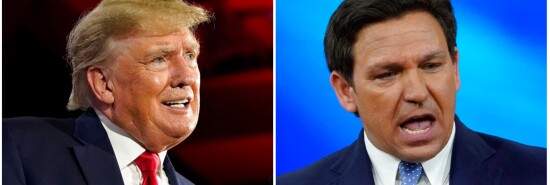
Big field, little field: Trump, DeSantis, and the GOP challengers
Byron York
BIG FIELD, LITTLE FIELD: TRUMP, DESANTIS, AND THE GOP CHALLENGERS. There’s been a lot of talk among Republicans about the effect a big primary field might have on the 2024 presidential nomination race. The short version is that a big field is thought to benefit former President Donald Trump, who, as in 2016, would not have to win a majority of votes to win — a plurality, and not even a big one, would be enough. On the other hand, a small field, especially a one-on-one matchup with another candidate, say Gov. Ron DeSantis (R-FL), might allow the challenger to defeat Trump.
Given that, there are Republican activists in the early voting states who are trying to keep the field small. They are talking to possible GOP candidates, asking them, if they should enter the contest and fail to win support, not to stay in a hopeless race if the effect of their presence is to increase Trump’s advantage over the field.
But now, a new poll suggests some of those concerns might be unfounded and that Trump could be in danger of losing no matter the size of the field. Done by the Republican firm OnMessage for the social conservative group American Principles Project, the survey questioned 1,000 likely Republican voters nationwide. The pollsters asked about a large field race, 14 candidates, and they also asked about a two-man, Trump vs. DeSantis race.
Subscribe today to the Washington Examiner magazine that will keep you up to date with what’s going on in Washington. SUBSCRIBE NOW: Just $1.00 an issue!
The question was simple: “If the 2024 Republican primary election for president were held today and the candidates were Donald Trump and Ron DeSantis, for whom would you vote?” DeSantis had a solid lead over Trump — 53% to 38%, with 8% undecided. The Florida governor also had a higher favorability rating than Trump, 82% to 72%.
If that is correct, a two-candidate primary battle against DeSantis would be a losing race for the former president. But of course, there’s no chance the GOP race will start as a two-candidate contest. So the pollsters asked voters about a big field, 14 candidates, that more closely resembles the fields from past GOP primary elections. In that scenario, Trump and DeSantis were essentially tied, Trump with 34% and DeSantis with 33.5%.
The news is that even with a big field that would supposedly help him, Trump had no lead. And after the two leaders came a big falloff, with Mike Pence at 6.3%, Nikki Haley at 5.5%, Mike Pompeo at 3%, Ted Cruz at 1.4%, Kristi Noem at 1.2%, Marco Rubio at 0.8%, Tim Scott at 0.7%, Larry Hogan at 0.7%, Josh Hawley at 0.4%, Rick Scott at 0.3%, John Bolton at 0.2%, and Asa Hutchinson at 0.1%.
In recent weeks, the nightmare scenario, for Republicans who want to see someone other than Trump win the nomination, is that a large field would let Trump win with, say, 30% of the vote while everybody else lagged behind. But the American Principles Project poll showed another scenario. Even in a big field, Trump is not winning. He and DeSantis are effectively tied.
And of course, big fields eventually become little fields. Candidates drop out. And when they do, where do their voters go? Given the fact that they began with a candidate other than Trump, it is at least possible that they will switch to DeSantis or another non-Trump candidate. In the end, Trump does not win their vote.
How many such voters are out there? In the poll, the 12 non-Trump, non-DeSantis candidates account for 20.6% of the vote. Assume they all run. As they drop out, unable to gain support, there’s a reasonable chance their support will go to DeSantis, if he is still the dominant challenger in the race. Of course, if DeSantis falters, the scenario would be quite different. But there might be a new, dominant non-Trump candidate.
The bottom line: It could be that Republicans who do not want Trump to win have worried too much about a multicandidate race. That is how GOP candidates are traditionally chosen when there is no incumbent president, and 2024 will likely be the same.
For a deeper dive into many of the topics covered in the Daily Memo, please listen to my podcast, The Byron York Show — available on the Ricochet Audio Network and everywhere else podcasts can be found. You can use this link to subscribe.
